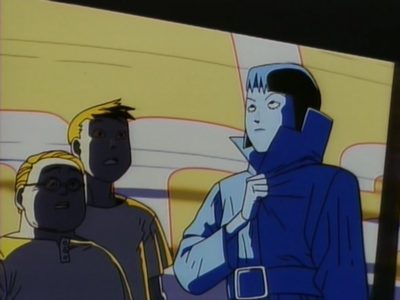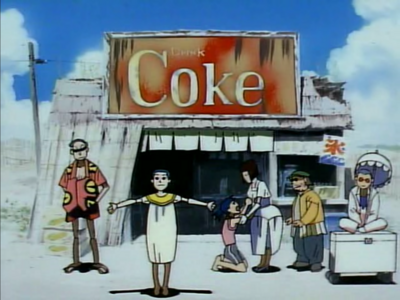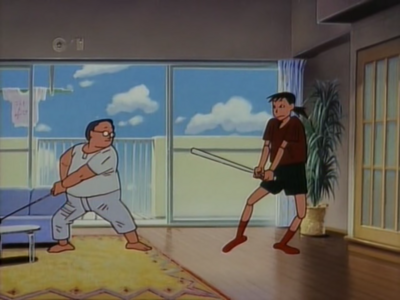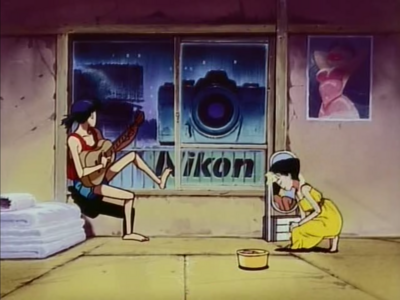

 |
 |
||||
| Home | Reviews | Extras | Forums |
|
Gosenzo-sama Banbanzai!SynopsisFather Kinekuni, mother Tamiko, and son Inumaru are a typical (and typically unhappy) middle-class Japanese nuclear family. While staring out the window on a lazy Sunday, Inumaru claims to see a "goldenrod" walking through the fields, and gets upset as his father pretends not to hear him saying this. In the middle of an escalating fight between father and son, a mysterious girl, Maroko, knocks on the door; it turns out that her yellow hat was the "goldenrod" Inumaru saw earlier. And she literally claims to be Inumaru's granddaughter......from the future. Although Kinekuni and Inumaru gleefully embrace her, Tamiko leaves the household in disgust....setting in place a dramatic chain of sci-fi esque events. ReviewWatching Mamoru Oshii's work feels kind of like reading William Faulkner, at least for me: it's extremely interesting from a historical and socio-political standpoint, and there's tons to unpack both in regards to setting and literary merit, but it's not that easy to enjoy precisely, and the plot itself isn't necessarily all that important to understanding and unpacking it. When I started writing reviews here, I had a reputation as that one girl who took on lots of "artistic" anime (whatever exactly that means), but because of my own changing tastes I spend far less time on experimental works now; getting Gosenzo-sama Banbanzai!, an early, obscure Oshii OAV series, as one of my RSS picks took me back to that time in my life (late high school/college) but also reminded me why I can only handle so much of this stuff. Gosenzo isn't precisely humorless or dry, but it's hard to "enjoy" in a traditional sense because it's uncomfortable even when it tries to be funny, and while I think that's meant to be the point, it both makes this show a little hard to stomach and hard to watch all at once. I do think that it's worth digging up if you're interested in commentary on the sociopolitics of 1980s Japan, but maybe expect this to feel a bit more like homework for a literature class than leisure time.   Another review (which I linked in the notes to this review, and which I highly recommend for a more in-depth unpacking) compared Gosenzo to Paranoia Agent, and I think I'd agree with that; Paranoia Agent, I'd say, is a lot more interesting to watch as an actual piece of entertainment than this, since Satoshi Kon's sense of humor has always appealed to me much more, not to mention that it's hard to keep your eyes off his bizarre, surreal imagery, but they're both still interesting. Gosenzo is, in a lot of ways, about the "traditional" Japanese nuclear family (pretty much a western import) falling apart, and it's very much like a play with a small cast; it's easy to write a play about a family if you don't have much of a budget, after all, because it gives you a relatively small cast to work with and, if you're concerned about domestic life, an easy set, as well. Indeed, the background art and scenery in this show are very limited, and outside of an introductory segment and a few short scenes, each episode basically takes place within a single locale: the first two episodes in the family apartment, the third in a little dive that Inumaru and Maroko end up running off to, the fourth in a shoddy seaside snack bar, the fifth in an abandoned roadside restaurant, and the last one at a ramen cart. Outside of the core cast of Inumaru, Tamiko, Kinekuni, and Maroko, meanwhile, plus two characters who become more important in later episodes, we hardly have any "side characters" to speak of....a "ramen cart owner" who we hear but never see in the last episode feels more like a plot device or even Inumaru's conscience talking to himself than an actual "character". Thus, watching this feels a lot like unpacking a play. The first episode/act shows us what's clearly a "typical" Japanese nuclear family but with some immediately obvious and sinister undertones. You have the father reading his newspaper on his day off, the mother keeping house, and their high school-aged son lounging around the house, which seems like a propagandist's ideal of domestic life. Looking at it from a more critical perspective, you listen closely enough to the dialogue and learn that neither the son nor father is particularly competent and neither much of a provider nor capable of being one in the future. You notice that neither really seems to care for each other much: Inumaru clearly thinks his father's work is pointless and sees him as a failure of a father figure, and Kinekuni sees Inumaru as lazy and a budding deadbeat (which, to be fair, he isn't really wrong about). In the first scene, Inumaru is staring out into the fields with his binoculars, obviously bored with life, and when his father proceeds to ignore his claim about a "goldenrod" moving through the fields, he starts snipping at his father for his lack of money....the fact that he got only enough allowance to buy a metal baseball bat. Given that this is Mamoru Oshii, that can't be unintentional (also considering Paranoia Agent): baseball's as much of a western import as the very idea of the nuclear family, not to mention it's stereotypically shown as a sport that red-blooded, hot blooded young men go for. It can't also be a coincidence that Kinekuni retaliates with a golf club, very much a symbol of upper-class life/keeping up with the Joneses. Tamiko, for that matter, mostly complains about having had to keep long hours and being irritated at the prospect of having to deal with people on a Sunday; still, there's at least a sense that she's significantly smarter than her buffoonish husband and delinquent son. And then, of course, a 17-year old girl who claims not only to be from the future but to be 17-year old Inamaru's grand-daughter walks in unannounced. And it's also obvious right from the start that Inamaru is completely infatuated with her, which could have its whole own review on just what that implies. Even if she isn't actually who she says she is (and I do argue that a lot of the imagery is ambiguous enough that you could make that claim), it's still true that somebody who genuinely believes that she's his granddaughter starts a sexual relationship with her....and that's, honestly, a bit hard to watch. Again, the title of this show is literally understood as "Long Live the Ancestors!" in English, and there's plenty to be inferred here regarding mindless worship of past customs and nostalgia.    Quite honestly, though Maroko is something of a weak link in this story in that she functions more as a plot device than as an actual character. Even if that's the intention, i.e. to expedite this family's falling to pieces and function as a standin for the idea of nostalgia, period, it still, again, was something that could make this show feel like doing homework more than anything. Now, as I said, I don't think that we're really meant to take it away that she was the one to ruin this family: we have almost a whole episode to watch how unhappy they are, and she's merely a catalyst. If anything, she really doesn't do much but stand still and look pretty, and that lets her be, essentially, a scapegoat for whatever circumstances are occurring. The family doesn't fall apart because of her, it falls apart because she's a convenient scandal for Tamiko to use as an escape route....and just to talk about Tamiko, considering that she's very, very unhappy with her mandated role and manages far more successfully than anybody else in her family, let's just say that while this show has a bit of a sexist veneer, it's at the very least critiquing outdated gender roles even if it doesn't go as far as totally throw them in the toilet. Maroko and Inamaru don't end up eloping and being broke because of anything she does, they end up A) eloping because Inumaru projects his sexual desires onto her and B) broke because Maroko's totally willing to work, but Inumaru "doesn't want her working in a dive" and insists on "being the provider", even though, when he's actually forced to work to pay off his debts, he turns out to be miserably bad at it. Heck, I even looked pretty cynically at episode/act 5, which has this outwardly nice "family coming together" feel (right before everything truly goes to hell), but of course, they're all on the run at the moment, and plus, it's again a case of Maroko being used as a scapegoat in a different way; she's treated as a "reason" or a "catalyst" more than anything. Again, you could ask yourself whether Maroko was even truly from the future or not, but it's almost irrelevant: regardless of who she is, the different members of the family use her for whatever they need to at a given moment. None of this is especially easy to pick up immediately when you're watching it, or at least it wasn't for me; it's a show that I felt that I had to stare at and think about a lot before I really took anything of value from it, not to mention that it's a show that can seem pointless until the penultimate and final episodes. That, again, almost gives it more the feeling of sitting through a play (where you expect there to be some resolution within one sitting) than a TV series, and I might go far enough to suggest setting aside a substantial block of time for it, that is, if you have the patience. This is not good for casual viewing, and I can say pretty confidently that it's not likely you'll watch this because you "like" any of these characters. Not to mention, the truth is that the dialogue itself tells you almost nothing, just as the plot of this story doesn't tell us much in itself: you learn more from watching characters' subtle motions, visual framing, and even the bizarre "the family life of birds" segments at the beginning of all but the final episode than you do from actually listening to what any of these people say. And as for the technical aspects, it's not that much different: it's not a very visually appealing show, and the character design is honestly sort of ugly, but I don't think I'm crazy for observing that the characters' limbs look almost more like marionettes than they do real people; perhaps it's commentary on people living out ideals or fantasies? Or being manipulated by their desires? Given that this is Mamoru Oshii, that can't be coincidental. You'll also notice subtle changes in the background art, not to mention using "bird versions" of the show's characters in each "science" sequence, and plenty of sociopolitical commentary in the OP's lyrics. Again, this is far, far closer to analyzing a painting for art school than it is squealing at cute yuri fanart on pixiv.    And that keeps bringing me back to a question....did I actually enjoy this show? Frankly, even now I'm not sure about that. I mentioned humor before, and my issue with a lot of Mamoru Oshii's humor is less that it's subtle, dry, or a bit pedantic (all of which it is) but rather that it can feel like he tries too hard to be subtle, dry, and pedantic for the sake of being "artistic." Humor is often something that makes academic pursuits more enjoyable; that, or I end up happening to think what I'm working with looks or sounds pretty. Neither of those is really at play here. I will say, though, that I did find this to be interesting once I started to appreciate the subtext a bit more, since political commentary is something that's interesting, and often completely absent from anime. I think that's a huge reason why this OAV has never made any sort of splash over here, but if you're interested in contemporary Japanese history then, I think, it's very worth seeing. But...maybe watch Paranoia Agent if you wanna "make learning entertaining." Or, at least, watch something like Konohana Kitan for cute fluff, afterwards. It's interesting to unpack, but not necessarily at all interesting to watch. If I ever taught Sociopolitical Commentary Through Anime 101 I'd definitely pick this as assigned viewing. It's a strong three or a weak four, but honestly the fact that I'm completely unsure if even "enjoyed" this at all brought it down a bit. — Nicoletta Christina Browne Recommended Audience: Probably teenagers and up. Incest (or possible incest) is pretty central to this, and while there isn't that much in the way of nudity, there's a lot of sexual tension underneath, plus a bit of violence and blood. Version(s) Viewed: Digital Source (Japanese with English Subtitles) Review Status: Full (6/6) Gosenzo-sama Banbanzai! © 1989 Mamoru Oshii / Pierrot / SPO / OCS |
 |
|
| © 1996-2015 THEM Anime Reviews. All rights reserved. |